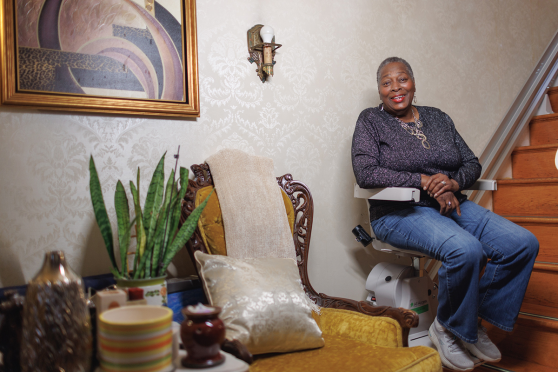You can take charge of your diabetes
Managing diabetes takes some practice, but these expert tips will get you off to a great start.

If you’ve gotten a new diabetes diagnosis recently, you have a new world to navigate. It might feel overwhelming, but it doesn’t have to be!
Day-to-day changes
If you have diabetes, your doctor has probably told you to start testing your blood glucose (blood sugar). This means you’ll need to prick your finger and squeeze out a drop of blood. You’ll put a little bit of blood on a test strip and put that strip into a device called a blood glucose meter. It will give you your blood sugar level reading. It can also show you trends over time, which you can share with your doctor. You and your doctor may decide that the right device for you is a continuous glucose monitor. This is a device you wear all the time that monitors your blood sugar every few minutes.
Diabetes impacts your body’s response to insulin, a hormone that helps move blood sugar into your cells. If you have Type 1 diabetes, your body doesn’t make insulin at all. With Type 2, your body doesn’t react to it as effectively as it did before. Having blood sugar that’s too high or too low can be dangerous. That’s why it’s important to test it regularly every day and to make choices that keep it in a healthy range.
To regulate your blood sugar, your doctor might have you count the carbohydrates (carbs) you eat each day. Carbs can increase your blood sugar. Some carbs increase it more than others, such as soda, white bread, and added sugars. To keep your blood sugar in a healthy range, it helps to eat a variety of healthy foods every day, including non-starchy vegetables like lettuce, tomatoes, and broccoli, as well as whole grains like whole wheat pasta and bread, brown rice, and oatmeal.
Exercising every day can also help you improve your blood sugar levels. Gina Trignani, RD, director of training and capacity building at the Health Promotion Council whose work focuses on diabetes care and management, says that exercise doesn’t have to be hard. “Something that you enjoy is the key to starting and sticking with daily activity,” she adds. Walking, dancing, biking, and yoga are all ways to get moving. Your doctor will talk with you about how much you should exercise. If you’re new to exercise, you might start with 10 minutes and work up to at least 30 minutes, five to seven days a week.
Some people with diabetes might also need medication, taken either as pills or by injection. Everyone with Type 1 diabetes, and some people with Type 2, give themselves insulin as a shot.
Build your team
You’re not alone when you have diabetes. You’ll have a team of specialists to help you manage your condition. You probably already have a primary care provider, and they will likely recommend that you see an endocrinologist. Certified Diabetes Educators (or CDE’s) are trained professionals who can help you navigate your diabetes at all stages. They’ll work with you to build a management plan that fits your lifestyle, schedule, and culture. You might also see a registered dietitian who can give you nutrition advice and help you plan meals.
There’s a lot to learn about diabetes, and your team of specialists will be important sources of information. Always go to your appointments with paper and a pen so that you can take notes during your visit. If you have a loved one who can go with you to help ask questions and take notes for you, that’s even better. It’s important for you to understand your condition, so ask all the questions you need.
Here are some specialists you will probably have on your team in addition to your primary care doctor:
- Endocrinologist
This is a doctor trained in managing diabetes. They may also be called a diabetes specialist. - Podiatrist
If your blood sugar is high for a long time, it can harm blood flow to your feet, which can lead to nerve damage and other issues. You can see a podiatrist for an annual checkup, or if you notice any changes in your feet. - Ophthalmologist
This is a special kind of eye doctor. Diabetes can damage the blood vessels in your eyes, which can affect your vision, so you should get regular eye exams. - Cardiologist
Diabetes often occurs alongside high blood pressure or heart disease. If that’s the case for you, a cardiologist can help. - Pharmacist
Your local pharmacist can also be an important part of your team. They can talk with you about medications you’re prescribed, including potential side effects or reactions with your other medications or supplements.
If possible, build a team within a single hospital system or health system. If you can do it, it makes it easier for your doctors and other specialists to share information and collaborate on your care plan.
If your specialists are spread out across different health systems, that’s OK too. Call each doctor’s office before your appointment and ask what medical records they’d like to have sent in advance.
Finding support
Having diabetes can feel scary or stressful, especially when you’re first learning how to manage your condition. People with diabetes are more likely than others to have depression according to the Centers for Disease Control and Depression. That’s why it’s so important to have people you can turn to for support. A licensed mental health professional, such as a social worker, therapist, counselor, or psychologist, can be a great resource. Your endocrinologist may also connect you with a local diabetes support group.
The most important thing to know about diabetes care is that it’s not a one-and-done situation, says Trignani. Be cautious about what you read online and in magazines, and check with your health care team before making any changes. “Managing diabetes is a lifetime commitment,” Trignani says. “It’s not just learning how to manage diabetes once. It’s going to be a lifelong adjustment. Changes throughout life will require adjustments to your management plan. Become active in your education and learn as much as you can, and find ways to stay motivated.” A healthy, happy life with diabetes is possible with a consistent and supportive approach. You’ll find ways to live healthfully and happily with diabetes.



